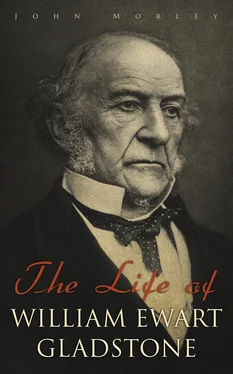It depended entirely on the Peelites whether the new government should be permitted to conduct the business of the session (subject to conditions or otherwise), or whether they should be open to an instant attack as the enemies of free trade. The effect of such attack must have been defeat, followed by dissolution forthwith, and by the ejection of the Derby government in June (as happened in 1859) instead of in December. The tactics of giving the ministers a fair trial prevailed and were faithfully adhered to, Graham and Cardwell taking their own course. As the result of this and other conditions, for ten months ministers, greatly outnumbered, were maintained in power by the deliberate and united action of about forty Peelites.
Lord Derby had opened his administration with a pledge, as the Peelites understood, to confine himself during the session to business already open and advanced, or of an urgent character. When Mr. Disraeli gave notice of a bill to dispose of four seats which were vacant, this was regarded by them as a manner of opening new and important issues, and not within the definition that had been the condition of their provisional support. 269'Lord John Russell came and said to me,' says Mr. Gladstone, '“What will you do?” I admitted we were bound to act; and, joining the liberals, we threw over the proposal by a large majority. This was the only occasion of conflict that arose; and it was provoked, as we thought, by the government itself.'
256.'He had told the Queen that he thought all the offices might be filled in a respectable manner from among the members of the Peel administration. On a subsequent day both Herbert and Cardwell made out from his conversation what I did not clearly catch, namely that Lord Aberdeen himself would have acted on the Queen's wish, and that Graham had either suggested the difficulty altogether, or at any rate got it put forward into its position.' Gladstone Memo., April 22, 1851.
257.Memorandum, dated Fasque, April 22, 1851.
258.Memorandum, Sept. 9, 1897.
259. Grey Papers .
260.To Phillimore, Nov. 26, 1850.
261.Greville, Part II, vol. iii. p. 369.
262. Georgics , i. 493-7. 'Aye, and time will come when the husbandman with bent ploughshare upturning the clods, shall find all corroded by rusty scurf the Roman pikeheads; shall strike with heavy rake on empty helms, and gaze in wonder on giant bones cast from their broken graves.'
263.Affirmation bill (1883) and Religious Disabilities Removal bill (1891).
264.One of the most illustrious of the European liberals of the century wrote to Senior:—
Ce que vous me dites que le bill contre les titres ecclésiastiques ne mènera à rien, me paraît vraisemblable, grâce aux mœurs du pays. Mais pourquoi faire des lois pires que les mœurs? C'est le contraire qui devait être. Je vous avoue que j'ai été de cœur et d'esprit avec ceux qui comme Lord Aberdeen et M. Gladstone, se sont opposés au nom de la liberté et du principe même de la réforme, à ces atteintes à la fois vaines et dangereuses que le bill a portées au moins en théorie à l'indépendance de conscience. Où se réfugiera la liberté religieuse, si on la chasse de l'Angleterre?—Tocqueville, Corr . iii. p. 274.
265.Namely Palmerston, Spring-Rice, F. Baring, Charles Wood, Hobhouse, Labouchere, Lord Howick.
266.This, of course, was Charles John Earl Canning, third son of Canning the prime minister, Mr. Gladstone's contemporary at Eton and Christ Church, and known to history as governor-general of India in the Mutiny. Stratford Canning, afterwards Lord Stratford de Redcliffe, was cousin of George Canning.
267.Graham spoke of himself as a tried reformer and as a member of the liberal party, and as glad to find himself the ally of so faithful a liberal and reformer as his fellow-candidate. He would not exactly pledge himself to support the ballot, but he admitted it was a hard question, and said he was not so blind that practical experience might not convince him that he was wrong. (Mar. 26, 1852.)
268.The same question greatly exercised Mr. Gladstone's mind in 1886, for the same reason, that he again hoped for the reunion of a divided party.
269.This was a bill to assign the four disfranchised seats for Sudbury and St. Albans to the West Riding of Yorkshire and the southern division of Lancashire. Mr. Gladstone carried the order of the day by a majority of 86 against the government.
CHAPTER VIII
END OF PROTECTION
( 1852 )
It is not too much to ask that now at least, after so much waste of public time, after ministries overturned and parties disorganised, the question of free trade should be placed high and dry on the shore whither the tide of political party strife could no longer reach it.—Gladstone.
The parliament was now dissolved (July 1) to decide a great question. The repeal of the corn law, the ultimate equalisation of the sugar duties, the repeal of the navigation laws, had been the three great free trade measures of the last half-dozen years, and the issue before the electors in 1852 was whether this policy was sound or unsound. Lord Derby might have faced it boldly by announcing a moderate protection for corn and for colonial sugar. Or he might have openly told the country that he had changed his mind, as Peel had changed his mind about the catholic question and about free trade, and as Mr. Disraeli was to change his mind upon franchise in 1867, and Mr. Gladstone upon the Irish church in 1868. Instead of this, all was equivocation. The Derbyite, as was well said, was protectionist in a county, neutral in a small town, free trader in a large one. He was for Maynooth in Ireland, and against it in Scotland. Mr. Disraeli did his best to mystify the agricultural elector by phrases about set-offs and compensations and relief of burdens, 'seeming to loom in the future.' He rang the changes on mysterious new principles of taxation, but what they were to be, he did not disclose. The great change since 1846 was that the working-class had become strenuous free traders. They had in earlier times never been really convinced when Cobden and Bright assured them that no fall in wages would follow the promised fall in the price of food. It was the experience of six years that convinced them. England alone had gone unhurt and unsinged through the fiery furnace of 1848, and nobody doubted that the stability of her institutions and the unity of her people were due to the repeal of bad laws, believed to raise the price of bread to the toilers in order to raise rents for territorial idlers.
AGAIN ELECTED FOR OXFORD
Long before the dissolution, it was certain that Mr. Gladstone would have to fight for his seat. His letter to the Scotch bishop (see above, p. 384), his vote for the Jews, his tenacity and vehemence in resisting the bill against the pope,—the two last exhibitions in open defiance of solemn resolutions of the university convocation itself,—had alienated some friends and inflamed all his enemies. Half a score of the Heads induced Dr. Marsham, the warden of Merton, to come out. In private qualities the warden was one of the most excellent of men, and the accident of his opposition to Mr. Gladstone is no reason why we should recall transient electioneering railleries against a forgotten worthy. The political addresses of his friends depict him. They applaud his sound and manly consistency of principle and his sober attachment to the reformed church of England, and they dwell with zest on the goodness of his heart. The issue, as they put it, was simple: 'At a time when the stability of the protestant succession, the authority of a protestant Queen, and even the Christianity of the national character, have been rudely assailed by Rome on one side, and on the other by democratic associations directed against the union of the Christian church with the British constitution—at such a time, it becomes a protestant university, from which emanates a continuous stream of instruction on all ecclesiastical and Christian questions over the whole empire, to manifest the importance which it attaches to protestant truth, by the selection of a Protestant Representative .' The teaching residents were, as always, decisively for Gladstone, and nearly all the fellows of Merton voted against their own warden. In one respect this was remarkable, for Mr. Gladstone had in 1850 (July 18) resisted the proposal for that commission of inquiry into the universities which the Oxford liberals had much at heart, and it would not have been surprising if they had held aloof from a candidate who had told the House of Commons that 'after all, science was but a small part of the business of education,'—a proposition that in one sense may be true, but applied to unreformed Oxford was the reverse of true. The non-residents were diligently and rather unscrupulously worked upon, and they made a formidable set of discordant elements. The evangelicals disliked Mr. Gladstone. The plain high-and-dry men distrusted him as what they called a sophist. Even some of the anglo-catholic men began to regard as a bad friend 'to the holy apostolic church of these realms, the author of the new theory of religious liberty' in the Scotch letter. They reproachfully insisted that had he headed a party in the House of Commons defending the church, not upon latitudinarian theories of religious liberty, not upon vague hints of a disaffected movement of the non-juring sort, still less upon romanising principles, but on the principles of the constitution, royal supremacy included, then the church would have escaped the worst that had befallen her since 1846. The minister would never have dared to force Hampden into the seat of a bishop. The privy council would never have reversed the court of arches in the Gorham case. The claim of the clergy to meet in convocation would never have been refused. The committee of council would have treated education very differently. 270All came right in the end, however, and Mr. Gladstone was re-elected (July 14), receiving 260 votes fewer than Sir Robert Inglis, but 350 more than the warden of Merton. 271We have to remember that he was not returned as a liberal.
Читать дальше









![William Frith - John Leech, His Life and Work. Vol. 1 [of 2]](/books/747171/william-frith-john-leech-his-life-and-work-vol-thumb.webp)


![William Frith - John Leech, His Life and Work, Vol. 2 [of 2]](/books/748201/william-frith-john-leech-his-life-and-work-vol-thumb.webp)